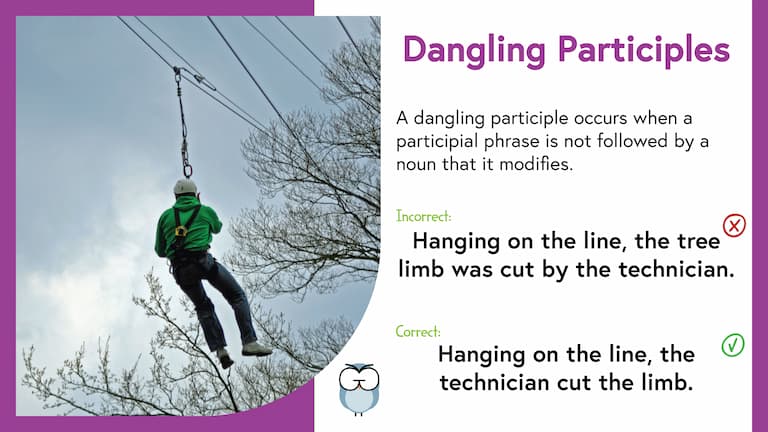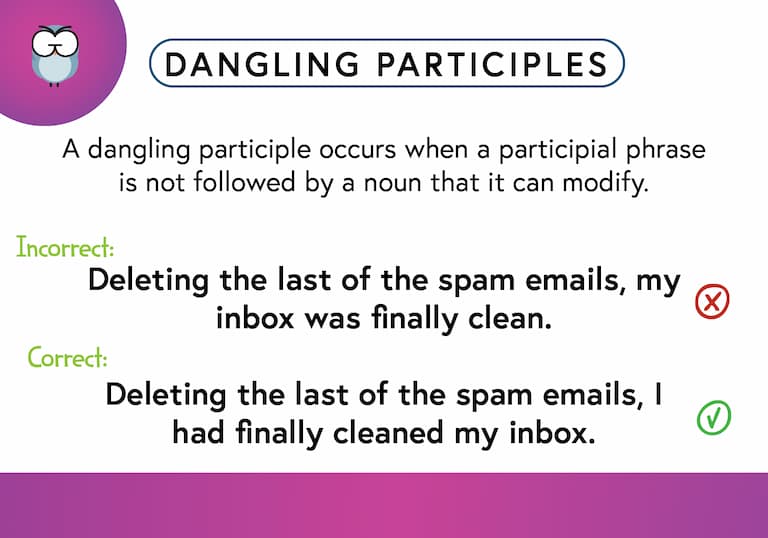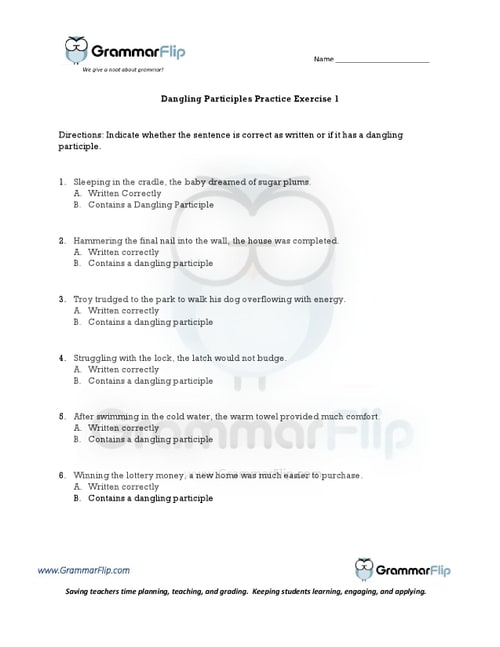What is a Dangling Participle?
A dangling participle can cause quite a bit of confusion (and maybe some unintended humor!) in one’s writing. A dangling participle occurs when a participial phrase is not followed by a noun that it can modify.
Deleting the last of the spam emails, my inbox was finally clean.
Correction: Deleting the last of the spam emails, I had finally cleaned my inbox.
After spending all day playing in the snow, the crackling fireplace brought much needed warmth.
Correction: After spending all day playing in the snow, we received some much needed warmth from the crackling fireplace.
Taking the last bite of turkey from Thanksgiving dinner, a long nap would surely follow.
Correction: Taking the last bite of turkey from Thanksgiving dinner, I would surely be in for a long nap.
Long-Form Videos: Dangling Participles
Long-form instructional video lessons allow students to engage with grammar concepts in more depth and detail.
This format provides students with a stronger foundation and a more comprehensive understanding of dangling participles.
Short-Form Videos: Dangling Participles
Short-form videos are an excellent way to review grammar concepts. Our two-minute instructional videos help students review the concept of dangling participles to further solidify their understanding.
Grammar-in-Context Videos: Dangling Participles
GrammarFlip’s grammar-in-context videos provide an additional layer of instruction, learning, and relatability.
Our unique and memorable video footage helps solidify the understanding of challenging grammar concepts.
Watch this video to better understand dangling participles!
Memorable Images: Dangling Participles
The use of images to connect visual cues with concepts makes it simpler for students to grasp and remember key ideas. GrammarFlip’s memorable images create visual associations that make dangling participles more engaging and easier to retain.

Definition Cards: Dangling Participles

Definition cards reinforce grammar concepts by providing clear and concise explanations that students can easily reference for quick review and better retention. GrammarFlip’s definintion cards help students review the concept of dangling participles to further solidify their understanding.
Why You Should Avoid Dangling Participles in Your Writing
As a writer, you want to have credibility with your audience, and to achieve that, it’s important that you avoid dangling participles in your writing. Remember that a participle is a form of a verb that functions as an adjective, so be sure that the noun or pronoun your particple is describing is being correctly referenced. If not, you may just cause some unintended humor!
Download a Free Worksheet on Dangling Participles!
Click the image below to download your free worksheet on dangling participles!

Need a grammar program that provides the instruction and grading for you?
Explore More GrammarFlip Lessons!
Parts of Speech lessons provide the building blocks of grammar. GrammarFlip covers these topics in detail to ensure a solid foundation is built. First time learners and students seeking to review the parts of speech can both benefit from the instructional videos and slide show reviews.
Parts of the Sentence lessons are critical for understanding how the parts of speech function in language construction. From the basic to the advanced, these lessons will cover a wide range of grammar topics that can be used in any grade level or classroom.
Mechanics and Usage lessons equip students with the necessary skills to communicate clearly to all audiences. With a focus on the application of these concepts in student writing, these lessons tie together both simple constructions of grammar as well as the more complex such that any age or skill level of student will benefit.


